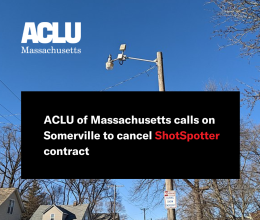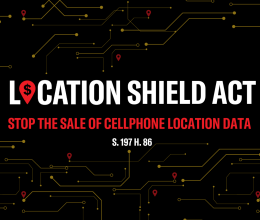
After finding last year that many school districts throughout Massachusetts have policies that do not adequately protect student privacy--or which even deny it--the American Civil Liberties Union of Massachusetts today offers school committees throughout the Commonwealth two model policies pertaining to student digital rights. These policies protect student rights and responsibilities pertaining to personal electronic devices such as cell phones, and the use of school internet and devices.
"The Supreme Court has held that neither students nor teachers shed their constitutional rights…at the schoolhouse gate. The digital revolution doesn't change that," said Kade Crockford, director of the Technology for Liberty Program at the ACLU of Massachusetts. "The ACLU believes public schools can provide their students with the latest digital technologies while preserving their constitutional rights to privacy and due process."
In October 2015, the ACLU published a report revealing that many schools in Massachusetts have policies disclaiming any student privacy interest in their digital activities on school networks and devices. Too many schools told students they had "no expectation of privacy" in their internet search history, email, and school devices such as laptops and tablets.
The ACLU investigation also found that policies related to personal electronic devices varied greatly. Where districts had policies governing cell phone use, they often did not give enough detail to provide students and teachers with easily understandable and clear expectations for behavior, rules, and consequences for violating rules.
To address these shortcomings, the ACLU has produced model policies on personal electronic devices and school technologies, and today offers them to the Massachusetts Association of School Committees and the largest 69 school committees in the state.
"We welcome the opportunity to work with school committees, parents, teachers, administrators, and students to ensure schools can take full advantage of the digital revolution while protecting both student privacy and safety," said Carol Rose, the executive director of the ACLU of Massachusetts. "These model policies, if adopted, will go a long way towards striking the right balance."
Both policies protect school districts, administrators, teachers, and students by requiring individualized suspicion of wrongdoing ("reasonable suspicion") before allowing a search of a student's electronic information or device. The policies also stipulate that, absent life-threatening emergencies, school officials may only share a student's electronic information with law enforcement if officers have a search warrant. Requiring warrants for law enforcement access to student information protects students from unconstitutional intrusions, as well as the integrity of serious criminal investigations.
"A lot has changed over the past few decades, technology-wise, but that doesn't mean our fundamental rights should change," said Crockford. "Students produce, share, and store sensitive information on their devices--sometimes including information about their parents, siblings, or friends. That information must be protected from improper access, and we offer these policies to help schools strike the right balance."
"Schools teach students how to be active citizens in our democracy," said Jessie Rossman, staff attorney at the ACLU of Massachusetts. "These policies teach our young people an important lesson: that they deserve privacy."
For copies of the model privacy policies from the ACLU, go to: https://aclum.org/student-privacy-policies






